Translations 677
Cuba and The New “Abnormality”

Cuba and The New “Abnormality”
 By Ricardo Ronquillo Bello
By Ricardo Ronquillo Bello
ronquillo@juventudrebelde.cu
June 20, 2020
Translated and edited by Walter Lippmann for CubaNews.
It’s not normal, it’s not normal, it’s not normal… I was repeating as in the chorus of an endless serenade by a well-known Cuban politician several months ago. He was doing it when the coronavirus still seemed no more than a disturbing little strain licking itself with its appearance in a market in faraway Wuhan and its unexpected and mournful Bib bang was not spreading it at lightning speed across the four corners of the planet.
Normality versus abnormality, here is a question, we could define a peculiar Cuban Shakespearean drama, which feeds on strains, some as strange and imposed on us as the very COVID-19, and others very much made in Cuba, made in Cuban socialism, as much as they make us proud in some cases, or beat us Theophilus-like on the chin of our welfare in others.
Because of the above, while a good part of the world is heading towards the renamed “new normality” – despite the fact that the daily death of thousands of people and other misadjustments, which some romantically believe will be corrected by the arts of the coronavirus, discredit or unmask it – in Cuba we should better assume that the country, with its first phase of de-escalation, is advancing towards its new “abnormality”, yes, as you read it, abnormality.
In this regard, the aforementioned Cuban politician can be justified not “in part”, as the vocabulary of the Creole bureaucracy is accustomed to saying, but in all his parts, which he repeats, repeats and repeats, and it is not a “rattle” of any kind, that much of what we live, enjoy or suffer in this archipelago is definitely not normal, although some people might like to believe it or even make us believe it for sometimes very devious purposes.
Let’s take an example, of those that were heard in passing and unfortunately without any major media outbreaks, in the fight against the coronavirus: in Cuban prisons there were no cases of the virus detected and, consequently, no deaths. Compare this with what happened or what is still happening in other places, or with humiliating snapshots of prisoners in the region that have shaken the world’s conscience.
The same could be said of the gesture made by the Cuban Government and people – quite silenced, by the way, even by the powerful international media of the most benefited country – to the MS Braemar cruise ship passengers. A later report by Ignacio Ramonet would highlight Cuba’s rare horizon in the tragic fate of many of those strollers adrift in the ocean of selfishness and lack of solidarity framed by COVID-19.
It is not normal in this pandemic world -it was not so before and, despite all the good omens, it will surely not be so common in the future- that the human being comes first, that definition contained in all the documents that give shape to the aspirations of Cuban socialism in the 21st century and that, due to repetitions and hackneyedness, sometimes become pedestrian slogans.
It is worthwhile “baldly” to compare those two previous pearls with the Malthusian reason that spread throughout the world at the same rate as the coronavirus to try to defend that the economy – it would be better to say the capital of the powerful – should be above the value of any life.
From the philosophy of disposable beings did not escape even prominent nobles, from whom at least a rationality as high as their humanism would be expected. However, some calmly justify, without any charge of conscience, that throughout Europe the number of deaths from COVID-19 is similar to that which occurs in a very strong flu season. Something like that is pure waste to form so much international fuss for what is nothing more than a common cold.
It is also very suggestive that the proposals that the highest Cuban authorities are offering to their announced de-escalation – already in the first phase in most of the national territory – point more towards a new “abnormality”, than a return to the previous normality, which would be like continuing to carry old atrophys and vices. We had already made progress in the midst of the virus.
This is out of tune with the dismissive way in which it seems that the lessons of the coronavirus will be assumed worldwide, from which an infinite number of currents and conceptions could be armed, from the most reactionary to those that claim to humanize capitalism or warn of reconfiguring the role of states and public and private actors.
The new “normality” here would be to return to that situation, for moments of levitating resistance, in the face of the U.S. blockade, without really aiming -with forcefulness and rigor- at a program of national development that, although it does not prevent the criminals and growing branches, definitely overcomes them more successfully than in the past. It would be to continue to rely on boats to fill the plates and as many thirsty tanks.
The new normality would be to settle for the scandalous resilience of old knots, which tie us to worn-out and repetitive ways of overcoming serious structural problems. It would be to continue feeding the criminal chains as opposed to the legal and necessary chains between the public and private sectors of the country. It would be to ignore the modern rules of communication -based on closeness and transparency- in order to continue clouding them with prejudice and instrumentality. It would be, it would be, it would be…
And nothing that was announced in the country for the post-COVID-19 escalation resembles the above, because it would be to resort to the old and worn-out normality, when what we need is to rush, overwhelmingly, towards a revolutionary abnormality.
But,” the politician would say, “it would be blissfully normal, right, normal…, although it does speed up a little, as Formell would say.
Rafaelia Knows About Discipline

Rafaelia Knows About Discipline and Responsiveness
As in all transcendental moments for the people, the people from Las Tunas are present in police work to watch over citizens’ health and security
 Posted: Tuesday Jul 07 2020 | 11:26:48 am. Updated: Tuesday 07 July 2020 | 11:42:10 am.
Posted: Tuesday Jul 07 2020 | 11:26:48 am. Updated: Tuesday 07 July 2020 | 11:42:10 am.
By Juan Morales Agüero juan@juventudrebelde.cu
Translated and edited by Walter Lippmann for CubaNews.
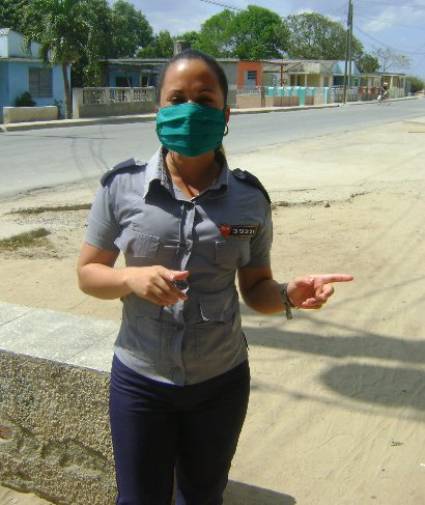
LAS TUNAS – “We women have always been present in the most transcendental moments of the history of the Revolution,” assures Rafaelia González. Author: Juan Morales Agüero Published: 07/07/2020 | 11:25
LAS TUNAS: Rafaelia González Rodríguez always had the feeling she was going to be a cop. At different times in her life, several of her relatives who wore uniforms conveyed to her the certainty that this was an important profession, responsible for guaranteeing public order, confronting crime and protecting legality.
‘That was one of the main reasons why I decided to study for a military career when my colleagues from MININT went to my pre-university to recruit students for the sector,” says the 24-year-old. I showed them my interest, and since then I have done nothing but strive to give my best to the people.
As soon as she finished 12th grade, she traveled to neighboring Camagüey to enroll at the Camilo Cienfuegos Military School.
These were five years of great rigor, both academically and in terms of training. According to her, she owes her will to improve and her sense of discipline to that school.
“I ended up as a cadet, and also as a law graduate in the criminology branch. In addition to that, the specialty itself, which in my personal case was public security,” she adds. In this last one, in the Camilitos I received the necessary preparation to be able to assume tasks like the chief of sector and to energetically face crime and illegalities in their different manifestations”.
After finishing her studies at the school in Agramonte, and by virtue of her evaluation results, the young woman began working at the police headquarters in Las Tunas. There, she was called to take an active part in the citizen’s organization in the context of COVID-19. She accepted, and from that moment on that is the task that occupies her day-to-day.
“My work at the headquarters is administrative, but I could not fail to join in this effort by our authorities to prevent the virus from spreading,” she said. Consequently, together with my colleagues, I enforce the health measures in place, including demanding physical distance in waiting lines and dispersing crowds”.
As far as she is concerned, she goes to her assigned site every day of the week to do her job. She says that in all cases she has always been respected by the people who come to these places. Even when she has called a person’s attention for violating any of the provisions, she has found receptivity.
“Many young people are involved in this work,” she says, “and among them, not a few women. In our case, we have overlooked domestic and family problems to respond to a call that we could not miss. We women have been present in all the transcendental moments of the history of the Revolution. And this is one of them.
“I have the support of my husband, an accountant who understands the duties of a military woman. I am also helped in every place I go by two members of the Prevention or Special Troops. The neighbors? They are supportive and grateful; they make themselves available for any need… Yes, I usually end up exhausted, but pa’lante. [life goes on]
Rafaelina is convinced that the participation of members of MININT in the control of citizens to prevent the spread of the coronavirus has been a great success. “Hopefully, this discipline and organization that we have helped to instill in the people in the present circumstances will remain for future stages,” she adds.
ELN: “We are on a peace mission”

Pablo Beltrán, ELN negotiator:
“We are in Havana on a peace mission, totally detached from military operations”
 Dianet Doimeadios Guerrero
Dianet Doimeadios Guerrero
Deputy director of Cubadebate. Holguín, 1988. Graduated from the Universidad de Oriente. Reporter for the newspaper “Ahora!” from 2010 to 2012. Contact: dianet@cubadebate.cu Twitter: @ddoimeG
Cuban journalist. Works in the Cuban Television Information System. He is a frequent panelist on the informative program Mesa Redonda de la Televisión Cubana. Permanent collaborator of Cubadebate.
July 13, 2020
Translated and edited by Walter Lippmann for CubaNews.
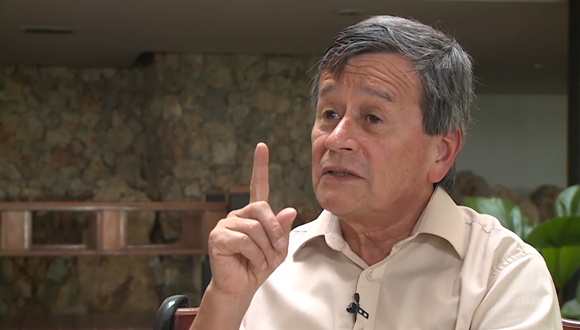
The commander of the National Liberation Army, Pablo Beltrán.
In Havana, one year and five months after the attack, Commander Pablo Beltrán states categorically in an exclusive interview with Cubadebate that none of the 10 members of the peace delegation of the National Liberation Army (ELN) were involved in the attack on the General Santander Police Cadet School in Bogotá. Not even himself, as a member of the Central Command (COCE).
After the event, which on January 17, 2019 took the lives of 22 students and the attacker himself, Colombian President Iván Duque Márquez decided to break off the peace talks with the ELN guerrillas and reactivate the arrest warrants against the members of the delegation, in Cuba since May 2018.
Today, the position of the Cuban authorities to respect the protocol of breaking the talks between the Colombian government and the ELN, and the decision not to extradite the guerrillas, are being used to question and manipulate the role of the Island as a guarantor of the peace process. Beltrán insists that the peace negotiators are “totally detached from any question of military operations” on Colombian soil.
-Commander Beltrán, what is your opinion on the Colombian Government’s argument for requesting the extradition of some of the members of the delegation following the attack on the cadet school?
-First, since we arrived in Cuba in May 2018, a commitment was made. It was the Santos Government and the National Liberation Army who asked Cuba to host the talks, as a guarantor country. That is why we came here, at the request of the parties. And Cuba, as a guarantor country, responded to that request. Secondly, when the new government was installed, it did not say: “Hey, come on,” but rather it said: “Stay there and let’s have a discreet meeting, let’s see what the other government left behind and we’ll restart”.
“When there was an attack by one of our guerrillas on a militarized police school in Bogotá in January 2019, it occurred to them to say that the delegation, even though it was here in Havana, was responsible. Something pulled out of their hat, isn’t it? Because we are here and, besides, I am a member of the national leadership of the ELN, but that does not mean that I am aware of or am commanding military operations in Colombia. My specific task is this whole process of dialogue.
“I am away from that, but even so, they insist on saying that the delegation had something to do with the attack, and based on that they ask Cuba for extradition, but the extradition is requested through Interpol. It turns out that Interpol’s statute, in chapter III, says that this type of matter does not proceed when there are conflicts between parties, that is, an internal Colombian conflict”.
-So you rule out any link between the peace delegation and the attack on the General Santander Police Cadet School in Bogotá?
-Yes, because we are here in Havana on a peace mission and totally detached from any issue of military operations; neither by communications nor by command, we have nothing to do with that, because that was the commitment we made with the two governments, the Colombian and the Cuban.
“I tell you, moreover, a specificity of how the ELN is structured. We have a national leadership, with about 20 members; a kind of executive, the central command, which there are five of us. We also have a body in charge of planning and conducting the operations, the General Staff. It is led by the military head of the central command, who is not me. So, the lines of operation that are drawn, the details of the operations, the times of the operations, the targets chosen, that’s strictly the management of the General Staff.
-Are there any members of the General Staff in Havana?
-No, there isn’t. The military leader of the ELN is Antonio Garcia. He was here in negotiations, but as in 2005, 15 years ago.
-Do you consider that the rupture and the crisis it has generated have been used to attack the guarantor countries?
-Very much so.
-There is information that relates this issue to the inclusion of Cuba in the list that the US Government is drawing up of countries that supposedly do not do enough in the fight against terrorism. How do you assess the position of the guarantors? Have they complied with the law, with the protocols written in black and white?
-It is a law of international peace negotiations to protect negotiating delegations, and the mechanism used is to sign a safe return protocol. We signed the agenda for the negotiations on 30 March 2016 in Caracas, and on 5 April, five days later, we signed the operating protocols, including the protocol of rupture, which is signed by the Colombian government, the ELN and five guarantor countries. That gives it the status of an international agreement; it was not just that Santos signed it, no, it is an international agreement and as such it has to be complied with.
“So, what the guarantor countries have said to the Colombian Government is that they are not going to dishonor their functions as guarantors. The focus of Norway’s foreign policy is the promotion of peace, and they accompany many processes around the world. The day that Norway says that it invalidates its responsibilities as a guarantor country is the day that it ends up accompanying peace processes.
“No one in the international community is going to do that, because in a world that has to be multilateral, every time there are conflicts there will have to be negotiations and negotiating teams; otherwise, there will be no more multilateralism”.
-And what do the protocols say about breaking up? What guarantees of life do they give to the parties who sit down at a table to dialogue?
-The Government of Colombia is committed to returning us safely to our camps, from where we left to conduct these negotiations; the guarantor countries, as has been the custom throughout these negotiations, are committed to accompanying us from the time we leave the negotiating site until we reach a safe place. That is what the safe return protocol strictly says.
“The guarantor countries have told the Government of Bogotá that their position to demand compliance with the protocol of rupture is invariable; neither today, nor tomorrow, nor next year, nor the following century will they change it. And the whole of the international community is increasingly accompanying the guarantor countries in this defense of the protocols”.
-Did Duque give any indication of an intention to break the dialogue table before the attack?
-The first thing they did the day after they positioned themselves was to put Ceballos (Miguel Ceballos Arevalo, High Commissioner for Peace) on the phone with me. I was here in Havana. He told me, “Well, we are going to hold a discreet meeting for several days, a part of the ELN delegation that is in Havana. That’s how contact began. Duque spoke of reviewing and making a connection with what Santos had left; but they never did it, they did not even deign to receive the agreements. And when they asked Duque what he was going to do with the agreements Santos had signed, he said ‘those are not valid because I did not sign them’.
“Then there were jokes in Colombia like ‘well, then he shouldn’t pay the foreign debt, because he didn’t sign it… since it’s eating up half of our GDP.
-Santos did not sign, the Colombian State did.
-Sure. The Constitutional Court said that at least three governments in a row are obliged to implement the Peace Accords. That’s what the Court says, but the government doesn’t care.
-Although the agreement is legally protected…
-If you look, Congress is closed, the president has already issued 160 executive orders governing, doing and undoing everything they could not do when Congress was open. The prosecutor is an employee of the president… That’s a dictatorship.
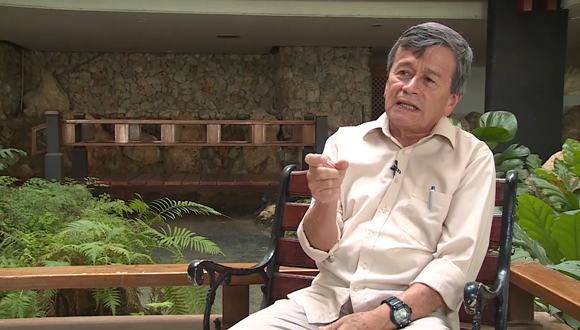
The guarantor countries have told the Bogotá government that their position in demanding compliance with the break-up protocol is unchanged, Beltrán says.
-In recent months, the ELN has taken some decisions that have been well-received by public opinion in the midst of the crisis in the peace process. For example, ceasefires and the release of detainees. How should these gestures be interpreted? Are they sending a message to the Government of Iván Duque?
-It has several interpretations. One is that the government is being told that the ELN is in a position to make peace, to pursue a political solution, and we invite it to join in. The other is that, in the Colombian conflict, the main victims are non-combatants, the population in general; the most impoverished and excluded areas are those that suffer the most. Therefore, every gesture that we can make has a fundamentally humanitarian message, it is not only as if we were ingratiating ourselves with the Government; it is also an invitation and, in essence, a humanitarian gesture.
-In the last few days, you have said that there will be no more unilateral ceasefires, only bilateral ones.
-Yes.
-Why?
-When the United Nations Secretary-General, António Guterres, called a ceasefire in March to better confront the pandemic, we accepted the proposal and made a unilateral ceasefire, but unfortunately, the military and paramilitary forces of the government took military advantage of that.
“For example, in many regions where we are, the persecution and assassination of social and community leaders has increased. So, today we say that we have the disposition for a new cease-fire in compliance with the United Nations resolution, but we also tell the government to participate, to join in a bilateral cease-fire that, in the end, is what will allow us to better confront the pandemic.
“I do not have a precise figure, but several hundred members of the Colombian Armed Forces are infected. There are countries that have had to confine their military forces due to the high level of contagion. It is not only a question raised by the UN; there is also a real threat of contagion within the armed forces”.
-But the government has already responded…
-The government’s a little tangled. President Duque went out on a tweet to say that he was setting conditions for the ELN to enter into a bilateral ceasefire, and it turns out that he is knocking on the wrong door, because it is the Security Council that is demanding the 90-day ceasefire, not the ELN. So let him answer the Security Council.
“We accept the call, the demand of the Council, and we believe that the best way is through bi-lateralism: that the government does it and the ELN does it. The response given by President Duque to the ELN is to knock on the wrong door and [that] does not exempt it from responding to the Security Council”.
-What do you think about the conditions that Duque has set for the bilateral ceasefire for 90 days? For example, he demands that the detainees be released.
This is the dark side of the matter, because, before he was in government, Duque was part of a very violent extreme right-wing coalition in Colombia, led by former President Uribe, which moves with a slogan: ‘Shatter the peace’. So, everything that the previous Santos government did, they came to hinder it.
“They come into the government and what are they going to do, well, shatter the peace. And they have done it. One example: as a result of the Peace Agreement of 2016, voluntary substitution plans were agreed upon with thousands of peasant communities that grow crops for illicit use, in order to eliminate those crops and start new ones, to promote the peasant economy. The first thing Duque did was to obey the dictates of Trump, who says ‘that’s not valid, and does me the favor and sprays me with glyphosate’. From that point on, social protest exploded throughout the region, with people demanding the fulfillment of the agreements and the army and police forcibly settling down, mistreating peasants and murdering several of them. Why? Because they were following orders from Trump.
“In Colombia, there is a very strong discussion, because it is a loss of sovereignty and the people who analyze Colombian foreign policy say that never had there been such a dark time, of so much unconditionality of the Government of Bogota before Washington. So, the problem is not only that Colombians want the peace process, it is that we have to fight with the United States to let it flow”.
-That could explain such a radical change in the Colombian State in the face of the dialogues with the ELN, the transformation of Santos to Duque. What else or who is moving Duque?
-Last Monday, former President Uribe had the idea of saying in a forum, I believe in Madrid, that the progressive opposition forces that want to reach the government in 2022 are a kind of reissue of Castro-chavism. Former President Uribe said this on Monday and Duque repeated it on Wednesday. I remember what Freud says, that when two people say the same thing, there is only one who thinks.
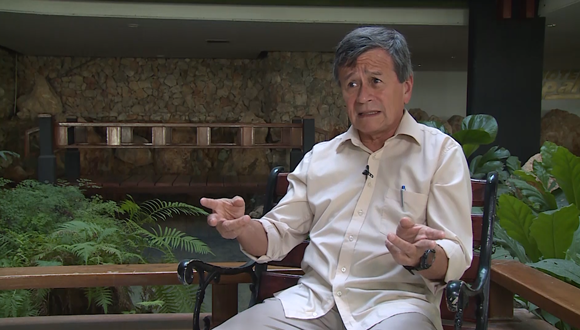
Duque was part of a very violent far-right coalition in Colombia, led by former President Uribe, he says.
-But during the first five months of the Duque government you were in dialogue. Could you cite some examples of the rapprochement between the guerrillas and the Executive?
-The coalition in the government is very diverse, a mix that ranges from fundamentalist evangelicals to the violent extreme right, including right-wing academics. There are some who agree with the dialogue and others who do not. We sent a peace officer last December to talk to former President Uribe and several contacts were made. At the end of December, he was arrested.
“So, if someone goes with goodwill to make discreet contacts and the same person who attends to him penalizes him, how do you build trust? I saw in the press on Thursday that in the prison where they are holding him, two dozen people have already been infected by COVID-19. There he is paying for this effort for peace.
-Can it also be said that Ceballos Arevalo, the Colombian government’s high commissioner for peace, changed his speech?
-That is a very serious problem in Colombia, because in the bureaucratic distribution of the government coalition, the position of peace commissioner is assigned to the Conservative Party. So, the faction of the Conservative Party that is with Uribe does so with Vice President Marta Lucía Ramírez, who is the head of Ceballos. But, at the same time, there is a think tank from an extreme right-wing university, Sergio Arboleda, from which Duque and Ceballos came, and the prosecutor who sets the lines on what to do in government. Surprise! Among the owners of that university is the Díaz-Balart family. What a small world, right?
-Is there any support or opposition from Colombian society and the political elite for breaking the dialogue between the government and the ELN?
-Colombia today is experiencing a kind of political storm that is coming. This week there have been several pronouncements in favor of resumption of the peace agreements. On Monday, Monsignor Monsalve, Archbishop of Cali, said: ‘They are carrying out a genocide with the agreements and with FARC’. More than 220 ex-combatants have been killed, more than 50 of their relatives have been killed… They are displaced, persecuted. They are displaced, persecuted. The intention to destroy peace was not left only for the papers, the people are suffering from it.
“Also on Monday, 94 U.S. congressmen told Duque (that is, Secretary Pompeo): ‘You have to guarantee compliance with the peace agreements; second, you have to stop the assassination of social leaders in Colombia and former combatants; third, you have to dismantle your paramilitary forces. On Wednesday, an important group of Colombian congressmen told Duque: ‘President, agree to a bilateral ceasefire with the ELN’. Very serious things are happening against peace. The political storm is no longer in the Colombian sphere and is now in a wider sphere”.
-Have you ever been sent from Colombia to stand up at the dialogue table?
-No, because the first instruction given to us by the national leadership is that we are never going to get up from the dialogue table, no matter how big the obstacles, the attacks. What we have said to the government is “name your delegate”. Ah, if you don’t want your delegates, then we will return to the camps.
-Is there any chance that the dialogue between the Colombian government and the ELN will be resumed?
-Yes. -Next month, Duque will barely be two years in office. He will have another two years left, and we have indications that all governments want to go down in history because they did something for peace, because that pays off politically, even if they do not do anything very concrete. This government must not be the exception and, furthermore, pressure from Colombian society and the international community to respect the peace agreements and resume dialogue continues to grow.
-In the medium and long term, do you see a definitive solution to the continuation of the revolutionary option through armed means?
-When there is a regime that no longer only kills leftist activists or leaders in Bogotá, but also indigenous leaders, peasants, it is committing genocide, systematic extermination. When you face that kind of extermination, the only thing that saves you is to defend yourself, to resist. In our case, we say that we have a firm commitment to agree an end to the armed conflict, but that this also implies transformations, because if you remove the consequences but leave the causes intact, the conflict remains.
“The most serious cause is the violence of politics. The majority in Colombia believe that Uribe is happy to bring violence into politics and he will be the last one to take the violence out of politics. We have the sincere willingness, but we doubt that the system has it. We say ‘count on the ELN for the political solution’, but the ELN will defend itself and resist.
-What conditions would they set to disarm?
-Colombia is a very complex country. I am going to give you a figure from about ten years ago, when they made a survey of the number of weapons they had given to civilians who were sympathetic to the extreme right. Two million. The Colombian Army and the Police total 500 000.
“When one talks about taking violence out of politics, it is not only that the army and the police stop considering everyone who opposes them as an internal enemy, but that everyone’s weapons are put on the table, because if it is only going to be the ELN’s, that is a story for minors.
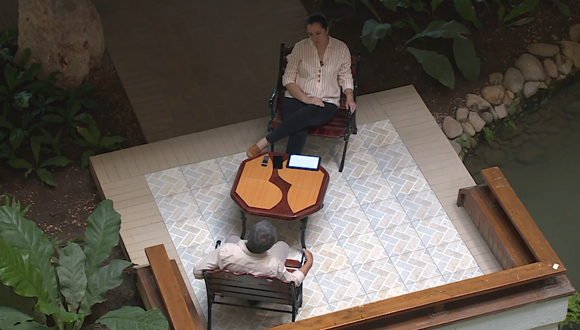
La mayoría en Colombia considera que Uribe está contento metiéndole violencia a la política.
-What lessons does Pablo Beltrán draw from the Peace Agreement signed by the FARC and the Executive, as well as from the process for its implementation?
-In 2016, we were finishing the confidential phase and beginning the public phase of negotiations with Santos. Everyone was telling us ‘do as the FARC does’. Last year they began to tell us, ‘Be careful, they are going to do the same as [they did to] the FARC’. That is what is being said in the streets of Colombia. What does this mean: that we are really facing an adversary that does not comply, neither in word nor in writing. How many are the members of the UN? About 200? That’s not good enough for them. The government does the same with all the pacts it makes after every social protest. So, if you have to negotiate with someone who does not comply, what rules do you make up?
“In the last round we had here in Havana with Santos, we were going to agree on one last bilateral cease and desist. We agreed with him on a 101-day period and we were going to agree on another one, so that when he left and Duque arrived he would find an active bilateral cessation. We couldn’t. We put a condition on them: a clause like the one used in international negotiations: if you fail to comply, you pay. We told them ‘let’s put another clause, if you default I default’; that is, the day you default, you authorize me to default, but by reciprocity.
“I believe the government delegate did not sleep that night. We told him ‘analyze that and tell us tomorrow’, and the next day he told us. “No, I called Bogota and they don’t want to know anything about it. They don’t want to know about reciprocity or any cost for not complying, which is what would guarantee the seriousness of a negotiation”.
-What is the situation of the guerrillas? Are they isolated or do they still have popular support?
-On Saturday, July 4th, we celebrated our 56th anniversary… Do you think that if important sectors of the Colombian people did not support us, we would be alive? What technique, technology, force or counter-insurgency resource that the United States has invented is not first tested in Colombia? It is not a merely military matter; it is, fundamentally, to have a social insertion. Whoever does not have it dies, whoever loses it becomes extinct.
-Analyzing the political situation in Colombia, the crisis of Uribism, the low popularity of the current president, the emerging political forces… Will the peace negotiations have any chance in the short- or medium-term?
-They have not one, but two chances. In the short term, a government, the deeper it is in a situation of illegitimacy – and there is also a loss of acceptance – could resort to the negotiating table as if to take a breath. In the medium term – and this is what we think will be more serious – the situation in Colombia is maturing so that by 2022 there will be a progressive government.
“The progressive force that opposed Iván Duque in 2018 obtained 44% of the votes. This is something historic, it has never happened before in Colombia. That force is there and it is growing. For us, to have a progressive government would be to have a valid interlocutor for peace negotiations.
-Then, will they manage to get violence out of politics? Is the ELN willing to do politics in times of peace?
-We are already doing politics, for a very simple reason. In the tradition of how the guerrillas organized themselves, we organized ourselves in a more Guevarist style, because the tradition was to build a party, an army and a front. We built a political-military organization, which has more democracy than an army, of course, but also a level of centralization. What does that imply? That we have a rural guerrilla, in uniform and with a rifle, but we have an ELN inserted in the population, both in the countryside and in the city, a clandestine militancy whose task is to accompany and organize the people every day. There will not be a political and social protest in Colombia where we are not, but they are not going to wear the ELN bracelet, they are the ELN that are there with the people.
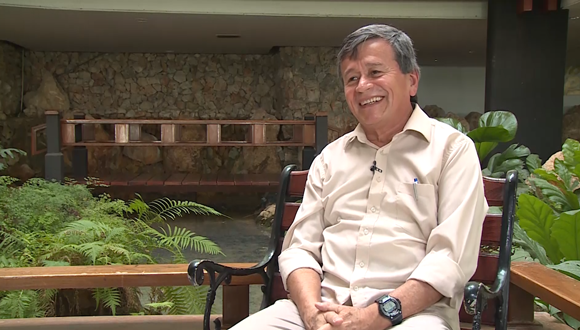
The commander of the National Liberation Army, and negotiator in Havana, Pablo Beltrán.
-Will there ever be peace in Colombia?
-We asked a FARC leader who was killed in this war, Alfonso Cano – with whom the ELN coordinated very well – about this once in a debate, and Alfonso said: ‘Nothing that the people get will be given away, everything has to be fought for. And what is the greatest good? Peace. Will they give it away? It must be fought [for].
“We will never abandon the path of seeking a political solution, but we will always defend ourselves. We have no vocation for martyrdom. One chooses these things because one considers that it is worth living and dying for them; otherwise, one would not choose this path.
In video, interview with Commander Pablo Beltrán
I’m Not Who You Think

spectator’s chronicle
I’m Not Who You Think
 By Rolando Pérez Betancourt
By Rolando Pérez Betancourt
July 12, 2020
Translated and edited by Walter Lippmann for CubaNews.
After 35 years of sustained triumphs in various films, French actress Juliette Binoche is once again shining in her latest film, which will soon be shown on Cubavisión.
I’m Not Who You Think (Safy Nebbou, 2019) is the story of a divorced, 50-year-old literature professor with two children who uses the tricks of Facebook to create a profile that turns her into an attractive 24-year-old blonde.
The causes and consequences of this change will be the main theme of this romantic drama with a thriller-like twist. It’s conceived in the midst of human relationships conditioned by technology and the masks that encourage so-called catfishing, or [creating a] non-existent identity in social networks with the aim of attracting unwary people.
In days of unbridled love passions on Facebook, Twitter and Whatsapp, director Safy Nebbou waves the trump card of Binoche and squeezes it into the role of a middle-aged woman trapped in the obsession of feeling wanted. Why not fall in love with a young man much younger than she? And the protagonist embarks on the adventure, even if she ends up in the hands of a psychiatrist. This is a resource that is used from the beginning to weave the threads of the story in two stages and thus expose the intimate worlds of a woman who, after the divorce, was exposed to the risks of depression.
The film takes a critical look at the lies and manipulations of social networks and is a treat for viewers to reflect on issues such as the fear of growing old, the age difference when it comes to love, and whether it “looks good” for a mature woman to go crazy with love (and delude herself into madness), as she would have done in her twenties.
We will then see an exceptional Juliette Binoche fall silent, when a young lover tells her that she could well be her mother; chat in the solitude of her home, pretending to be the little girl she is not; fall into the chaos of uncertainty and moral collapse; shine like a sun and explode into childish euphoria when she feels wanted.
The film is all of her, and also a story of loneliness on days when it seems that everyone is connected.
A Motherhood Story

JR Podcast: A Motherhood Story
On this occasion, JR Podcast spoke with Dachelys Valdés and Hope Bastian, who were recognized by the Cuban state as Paulo’s mothers. Read on and listen to the story.
 By Dailene Dovale de la Cruz
By Dailene Dovale de la Cruz
digital@juventudrebelde.cu
July 20, 2020
Translated and edited by Walter Lippmann for CubaNews.
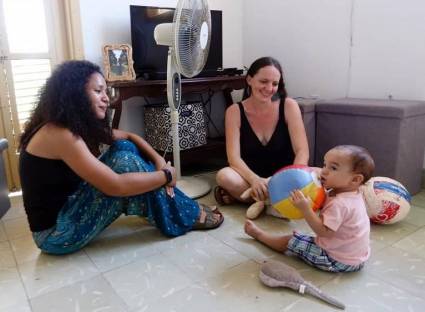
Dachelys Valdés and Hope Bastian, mothers of Paulo Author: Courtesy of the source Published: 20/07/2020 | 06:07 pm
Dachelys Valdes and Hope Bastian were returning from Florida with a concern. Would the pregnancy test be positive?
They met in Cienfuegos, in 2015, during the First National Meeting on Gender Studies and Non-Heteronormative Sexualities. They fell in love. They started a relationship and when they saw it consolidated, they decided to have a baby.
The first thing they did was consult their family doctor. He, kind and diligent, investigated the possibilities of accessing assisted reproduction services and returned the bad news. They could not access the service because equal marriage was not yet recognized in Cuba.
Nor did they find other options. Or yes, but in extremely risky ways.
A friend could pretend to be a partner of one of them, but what if he claimed his rights as the biological father? So many possibilities for disaster: divorce, death. They didn’t want to live in fear. They traveled to Florida with a very deep longing. On their way back they had a little boy in Hope’s belly.
Hope’s name is equivalent to our Esperanza that symbolizes very well the feelings of both women, when they got off the plane on Cuban soil.
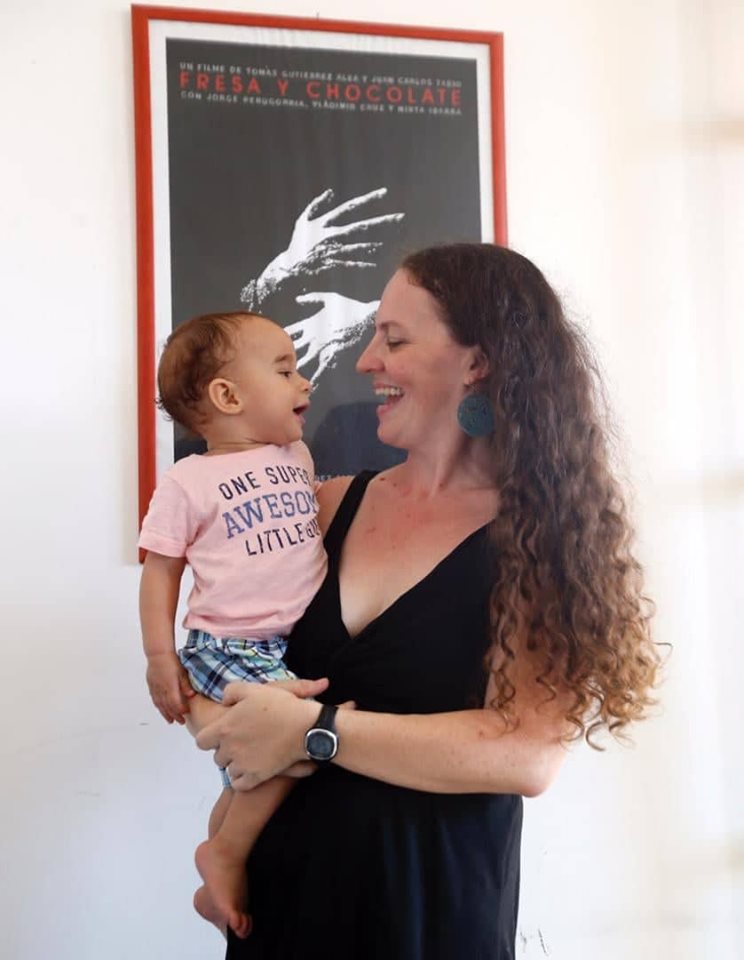
Photo: Courtesy of the interviewees
In Cuba, the birth certificate was slightly changed. The doctor, without anyone getting in the way, crossed out the predetermined male figure and wrote down Dachelys’ name. A small but significant gesture.
Dachelys Valdés is grateful and remembers this stage fondly. They attended the consultations with an in vitro fertilization specialist, no matter where it took place. They did not receive any discriminatory treatment, nor did they feel vulnerable, she confesses. And those who listen to her voice, very clear and soft but not docile, regain their faith in a more inclusive, less prejudiced and homophobic nation.
At the polyclinic, when they were going to be tested, they often tried to look for some sign of embarrassment in it. When they made it clear that they were the accompanying couple, they said “ah, it’s all right”, without further reaction.
Paulo was growing up in Hope’s womb in a calm and happy environment.

Photo: Courtesy of the interviewees
That was a collective pregnancy, the two first-time mothers were accompanied by fathers, brothers, friends.
That group of loving and supportive people has grown over time. I learned part of their story from a teacher at my school, Rocío Baró. One afternoon, at the end of 2019, she told me about the procedures both mothers took to obtain the Cuban citizenship of their little boy. She spoke with such great admiration of these two women that I promised myself to learn more about them, their experiences, their careers and their joys.
The desire became palpable in mid-June. I was checking Facebook, almost like an automaton, when the news came out. “The Cuban state legally recognizes that Paulo has two mothers.”
It had been worth the effort of the trip, for Dachelys to study how the birth would be, but in English. The losses in terms of comfort, being away from much of her support network.
…
Paulo’s citizenship is still an ongoing project, but it is getting closer. They have a document from the Ministry of International Relations, which endorses the possibility of access to the childcare center and free health services.
They also have a birth certificate, which guarantees double maternity, for the first time in Cuba. They arrived at great happiness, free of fear. The process of obtaining such a certificate was slower than usual for families made up of both parents.
First, they started the procedures from Florida, they sent the documentation by post and the certified translation. They returned with their child on a family visa, because it was more feasible to carry out the procedure from Cuba. They knew that due to the newness of the case, the process would take time. They did not expect it to be around a year, nor did they imagine a pandemic. Instead, they confess to being safe and grateful for the end result, of not being left behind.
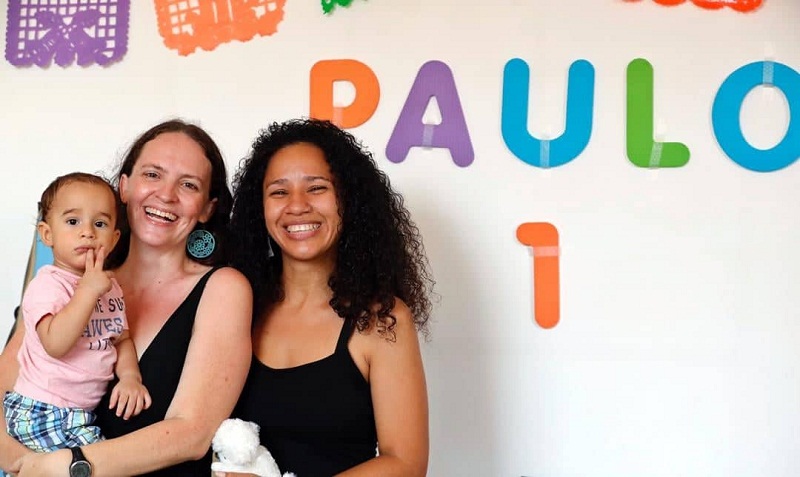
Photo: Courtesy of the interviewees
Since the announcement of their happiness, Dachelys and Hope speak a lot, to anyone who wants to know their story. They tell how they managed to realize their pregnancy and the remaining steps so that their child, for example, can have access to the food in the ration book. They feel that by telling of their experiences they make the LGTBIQ+ community more visible, the need to recognize the diverse forms of family, the access to assisted reproduction by same-sex couples, eliminating stereotypes. To recognize love and commitment as the only requirement to form a family.
They would like their story not to be isolated, not only for couples with resources and access to treatment in another country, although they understand that the laws and social sciences need reality to knock on their doors. And they are ready to continue, with every knock and every step, to bequeath to Paulo a more inclusive and happy Cuba.
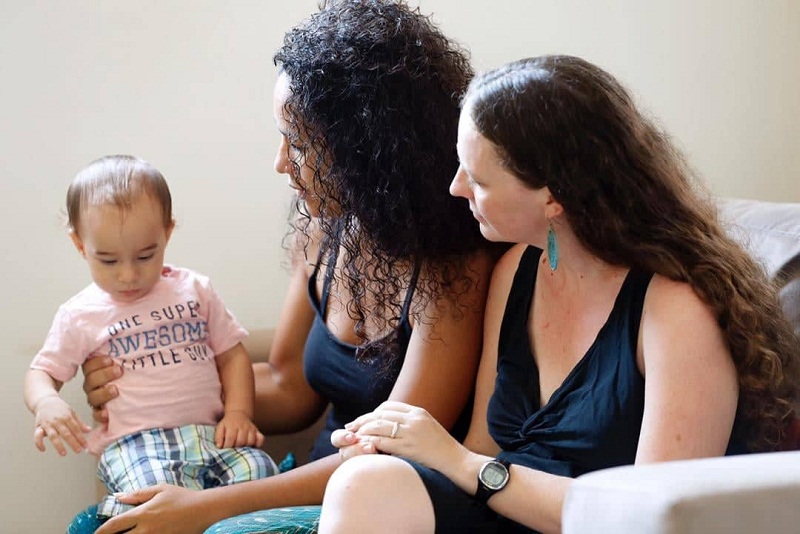
Photo: Courtesy of the interviewees
These are some excerpts from this story. If you want to hear from the voice of Dachelys Valdés and Hope Bastian, the emotions, fears, unforgettable moments, just listen to our podcast. Don’t miss it! [in Spanish]
Women’s Faces and Actions

Women’s Faces and Actions
In Santiago, 17 women serve as sector chiefs of the National Revolutionary Police (PNR)
By Odalis Riquenes Cutiño
July 18, 2020
Translated and edited by Walter Lippmann for CubaNews.
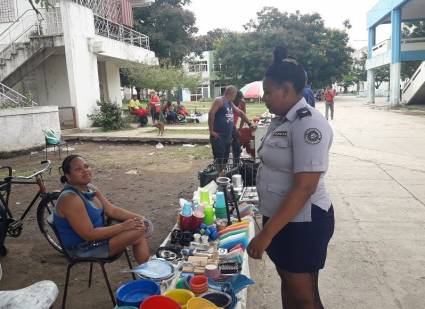
“If women build, how can we not be able to maintain order in the neighborhoods,” says First Lieutenant Evelyn Blanco Cadalzo, in charge of sector No. 102, in the Jose Marti Urban Center Author: Jose Angel Morales Published: 18/07/2020 | 10:24 am
SANTIAGO DE CUBA. For eight years now, the days of the young first lieutenant of the National Revolutionary Police (PNR), Evelyn Blanco Cadalzo, have had the duration of the surrender, the imprint of the sense of duty.
That’s just how long since she graduated from the former Interior Ministry (Minint) Hermanos Marañón University, as a law graduate specialized in public security. Since then, she has been the head of Sector 102 of the First Station, popularly known as Micro Nueve, in the José Martí urban center.
She has under her jurisdiction Blocks A and B of the José Martí Sur Popular Council, a community where she was born and has lived for her 27 years. It’s an area which, although not complicated in terms of criminal potential, is a recipient of criminals from other parts of the city who come there to commit offenses and crimes, such as robbery with force and theft with violence.
Preserving order in the place where you were born, where you have your friends and everyone knows you can be difficult if you are not clear that when duty calls, it is the first thing to be maintained: “You have to have character, set limits well and show that things done badly should not be seen by anyone anywhere in the world.
At the beginning of the year, this novel member of the PNR showed her courage and professional stature by getting involved in what could be considered the most notorious case she has ever been involved in: the capture of an escaped rapist, whom she had to protect from an angry mob with no other shield than her own body.
Hours earlier, as part of her operational work, she learned of the occurrence in her popular council of the reprehensible act against an eight-year-old girl,. Her first admitted thought was for his three-year-old daughter, Hasly Emely Estiven Blanco. She even thought about what she would do to that monster if she had it in front of him at that moment.
Later, chance gave her the opportunity to support her partner in charge of the investigations in the case, first sub-officer Luis Salmón Borrero,. After a long time of tracking him, when she found the offender in the middle of a crowd trying to lynch him, she reacted as she was taught in the ranks of the Cuban Police and took him out at the risk of her own life, protecting him until she could drive him.
“At that moment I felt it was my duty to prevent that man from being attacked. Cuba is a state governed by the rule of law and no one can take justice into his own hands; that is what the law is for,” she stressed.
Evelyn’s daily routine knows about beginnings, but never about the time of return, and even less about what each day will bring: “You know that you start work at 8:00 in the morning, the rest is dictated by the day. Sometimes you think: I’m going to have a little meal at home today… and in the end, you can’t because you have to do a search, an operation, or you get information that you have to deal with immediately. That’s why I’m so grateful for the support of my husband and my whole family, especially in caring for our daughter.
It is common to see her correcting, explaining, orienting, preventing the same thing in her office, in Block J of the José Martí district, or in the area for self-employed workers next to the shopping center in Block B. She considers it her “red zone” because everyone has a license, but some persist in selling industrial products that constitute illegalities.
Whoever observes her realizes that she knows how to be firm and energetic, without losing her tenderness. Her walk is filled with the authority and respect that she has earned through her daily performance.
“The work of the sector chief is very rewarding. At the beginning, it can be cumbersome, but once you organize it and get to know the factors of the community, you realize that it is among the best specialties of MININT, because it allows you to communicate with people”.
Everyday heroines
The experience of First Lieutenant Evelyn Blanco Cadalzo is not unique in Santiago de Cuba, where 17 women, mostly young, work as sector chiefs in the PNR stations.
Being a woman and leading a sector does not imply any additional limitations, insists Evelyn Blanco. “It used to be seen as something rough, but not anymore. Today people in the community accept it, take it as something normal, which we can perform successfully. If women can build, how can we not be able to maintain order in the neighborhoods? Everything is in the heart and the dedication you put into it; that’s how you earn respect.
However, there are still hurdles to overcome in the experience of First Lieutenant Gretchen Pérez Delgado, sector chief at the 30 de Noviembre Popular Council. She goes out every day to combat illegalities in an area plagued by many important economic objectives and a very diverse population.
“Each day brings complexities. Sometimes people on the street think that because you are a woman you are not going to do your job and they try to look down on you. We have shown that we can do this work, and in fact, we do it with the same quality as men,” insists this energetic girl, the mother of a two-year-old girl.
For First Lieutenant Tamara García Cala, chief of sector No. 62, in the community of PetrocasasSalaíto, in the Abel Santamaría Urban Center, without the support of the family it would have been impossible to get the job done during her two and a half years of service.
So does Lieutenant Reyna Nápoles Fabré, who heads Sector 55, which covers the San Juan area. Her two children and her husband have been instrumental in her performance. With 29 years of service in the FAR and MININT, she walks without fear at any time in her territory: “Being a police officer is my pride, and I really like the work as head of the sector because every day you learn about the human being and their social performance.
“I try to enforce what is established, but always reaching out to people. Every day I get up at 5:00 in the morning to be early in my area. The first thing I do is visit the community factors, get interested in the social reinsertion of some who are on probation, for example. Explaining, giving arguments, are keys to achieving the transformation of people, emphasizes Naples Fabré.
During the last three months, the rigors of the confrontation with COVID-19 in the slums added new tasks for these community heroines. For more than ten hours, the first NCO, Yenis Pereira Batista, sector chief in the Abel Santamaría neighborhood, risked contagion until she was able to transfer a suspected case of SARS-CoV-2 to the hospital.
“Usually,” she says, “I stay more at work than at home, and in this health situation, I have been almost always in the Sector, walking the area, visiting families and verifying that the measures are being complied with. When we see that we were able to contain the epidemic, without being confident, it is comforting to know that it was worth the effort.
This satisfaction is also felt in many communities in Santiago and in other provinces, where the population lives its daily life with confidence because they know that women and men of the stature of the interviewees defend the order and tranquility of the citizens in their neighborhoods and streets.
Viola Davis Regrets Acting in THE HELP

Viola Davis Once Again Regrets Performing in THE HELP
July 15, 2020
Translated and edited by Walter Lippmann for CubaNews.

Viola Davis plays Aibileen Clark in the 2011 Maids and Ladies Firm. Autor: Frame of the film Published: 07/15/2020 | 02:50 p
This is not the first time that Viola Davis has publicly rejected her role as Aibileen Clark in the drama THE HELP, which this time she has described, in an interview with Vanity Fair magazine, as a film that maintains “the narrative of the white savior” and that did not give enough prominence to the black maids, reports the DPA agency.
The actress, who was nominated for an Oscar for best lead actor for her appearance in that film in 2012, has once again shown her regret, now within the context of the Black Lives Matter movement. Already in 2018, Davis showed h displeasure with the film directed by Tate Taylor in 2011.
“There’s no one who hasn’t enjoyed THE HELP, but there’s a part of me that feels I betrayed myself and my people,” Davis explains in an interview for the magazine she’s the cover of. “I was in a movie that wasn’t programmed [to tell the whole truth],” she adds, denouncing that the film is made “with the filter and the sewers of systematic racism.
Davis also denounces the lack of Black voices in the creative process in Hollywood. “There are not a lot of narratives that are involved in our humanity [referring to the African-American community],” she explains. She adds that the writers, directors and producers “try to delve into the idea of what it means to be Black, but thinking essentially about a white audience.
She added that in Hollywood “there are not enough opportunities for an unknown Black actress” to “get ahead” in the industry. In this way, Davis, who had already been nominated for an Oscar before THE HELP for her role in THE DOUBT, justifies her participation in the film that also starred Emma Stone, Jessica Chastain, Bryce Dallas Howard and Octavia Spencer, who won the Oscar for this film. “I was that actress who was trying to get into [the industry],” she says.
Not only Viola
Just a few weeks ago, Bryce Dallas Howard also disowned the film and recommended that the public not see THE HELP as a reference for fighting racism. The singer also added that she “would not” have participated in the film if it had been shot today.
It was in an interview with the Los Angeles Times that the Jurassic World actress spoke about the need to give voice to Black creators and for them to be the ones to address the African-American reality.
“I wouldn’t appear in the film again [if it had been made today]. I’ll tell you why: I’ve realized that now people have the courage to say, ‘With all due respect, I love this project, but I don’t think you should be the one to direct it. That’s a very powerful thing, to be able to say it,” the actress explained.
“In this transformation that’s happening, a new freedom of expression is emerging,” Howard added, emphasizing the importance of black voices in the industry, referring to the Black Lives Matter movement.
US Betting on Reality Not Falsehoods

US Betting on Reality and not Trump’s Falsehoods
As new cases of the disease reach 60,000 a day across the country, many leaders, including those who supported Trump’s aggressive approach, now have no choice but to prioritize science over policy, leaving the president out of touch with reality
July 14, 2020
By Juventud Rebelde
digital@juventudrebelde.cu
Translated and edited by Walter Lippmann for CubaNews.
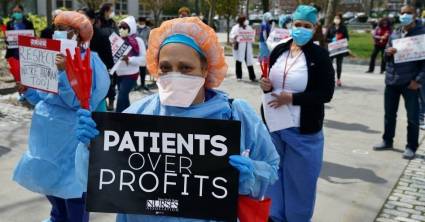
New cases of the disease reach 60,000 a day nationwide Author: Getty Images Posted: 07/14/2020 | 02:15 pm
While President Donald Trump is obsessing over his reelection hopes in his White House bubble, state and local leaders are frantically reversing the state reopenings he demanded, making the United States the largest access point for the coronavirus in the world, says a CNN analysis.
As emergency rooms filled up and the virus accelerated its relentless march through southern and western states, Trump clung to the fiction that the worst is over: “We had to close it; now we’re opening it,” President Trump said of the economy, patting himself on the back for saving “millions of lives.
As new cases of the disease reach 60,000 a day across the country, many leaders, including those who supported Trump’s aggressive approach, now have no choice but to prioritize science over policy, leaving the president out of touch with reality.
In Texas, Houston Democratic Mayor Sylvester Turner proposed a two-week shutdown, days after Republican Governor Greg Abbott raised the possibility of tougher measures after issuing a mandate to wear the mask that offended conservative orthodoxy. West Virginia called for the closure of bars in the hardest-hit county.
In California, Democratic Governor Gavin Newsom ordered the closure of all restaurants, grocery stores, movie theaters, zoos, museums and all bars. Los Angeles and San Diego said their children would start the new school year online only. Oregon banned gatherings of more than ten people inside due to an “alarming increase” of cases in the state.
KFC encouraged franchises in Florida, Texas, Oklahoma and California to stop serving. Florida on Saturday set a record for any state in one-day data on new infections, and COVID-19 cases continue to rise.
The picture is one of a nation that is beginning to close again in defiance of the President’s triumphant but misleading claims that he is leading a “transition to greatness,” the analysis released by CNN says.
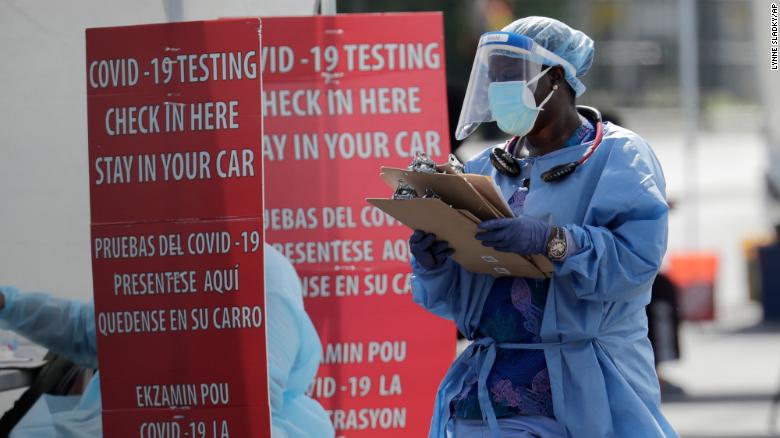
A health care worker carries a stack of clipboards at a COVID-19 testing site sponsored by Community Heath of South Florida at the Martin Luther King, Jr. Clinica Campesina Health Center, during the coronavirus pandemic, Monday, July 6, 2020, in Homestead, Fla. (AP Photo/Lynne Sladky)
The restrictions imposed on cities as large as Houston and Los Angeles could reverse the surprising economic revival of last month. The modest employment gains, trumpeted by the President, could turn into permanent job losses.
In comments that are likely to infuriate Trump even more, Dr. Anthony Fauci, director of the National Institute of Allergy and Infectious Diseases, made what is, unfortunately, becoming an obvious point: the rapid openings have triggered a disaster.
“It’s very clear — and we know from countries around the world — that if you physically separate people to the point where you don’t allow the virus to spread … we know we can do it if we close,” Fauci said at a Stanford Medical School webinar.
“We don’t close down completely – and that’s why, when we went up, we started going down, and then we stagnated at a level that was really quite high – about 20,000 infections a day,” Fauci said. “So, when we started to reopen, we’re seeing today’s waves, as we speak, in California … in Arizona, in Texas, in Florida, and in several states.
There are some bright spots. For the first time in months, there were no COVID-19 deaths in New York City in a 24-hour period, a moment of liberation that Democratic Mayor Bill de Blasio called “knock and move.
Massachusetts announced that its seven-day average of positive tests had fallen to 1.7 percent — 94 percent less since mid-April. The lesson for states now at the center of the storm — which predated the U.S. Centers for Disease Control and Prevention’s guidelines on safe reopening — is sobering.
New York and Massachusetts bought what may still be only a temporary truce with the coronavirus for weeks of closures and a strict reopening process that waited for the infection curve to be properly suppressed before restrictions were lifted. Even now, there is no guarantee that the virus will not return to dangerous levels when normal life returns.
However, El Nuevo Herald reports that Florida reported 9,194 new confirmed cases of coronavirus on Tuesday and 132 deaths in 24 hours, the highest number of deaths from the disease recorded in the state since the start of the pandemic in March, according to the Florida Department of Health.
The state set a national record on Sunday with 15,300 infections on the day, but Republican Gov. Ron DeSantis of Florida is insisting on a reopening.
Assisted Reproduction Options

Roads are Opening Up
The Assisted Reproduction service combines various techniques to achieve a pregnancy when something prevents it from occurring naturally. It is an expensive specialty and demands technology, both for the diagnosis of the obstacle and for its solution
By Mileyda Menéndez Dávila
July 14, 2020
Translated and edited by Walter Lippmann for CubaNews.

Assisted Reproduction Author: Juventud Rebelde Published: 14/07/2020 | 11:04 pm
The Assisted Reproduction (AR) service combines various techniques to achieve a pregnancy when something prevents it from occurring naturally. This is an expensive specialty that demands technology, both for the diagnosis of the obstacle and for its solution.
High-tech options
Vitro Fertizization (IVG) requires an authorized laboratory for the sperm to fertilize the oocytes in a controlled environment. In less than a week, viable embryos can be transferred to a woman’s uterus to follow the natural course or frozen.
It is a complex, laborious method; only a quarter of the transfers are effective. The number of attempts depends on the number of embryos achieved.
There are classic IVF (the environment is created and the cells are activated) or by intracytoplasmic injection (the sperm is inoculated directly into the cell). In Cuba the first one is done.
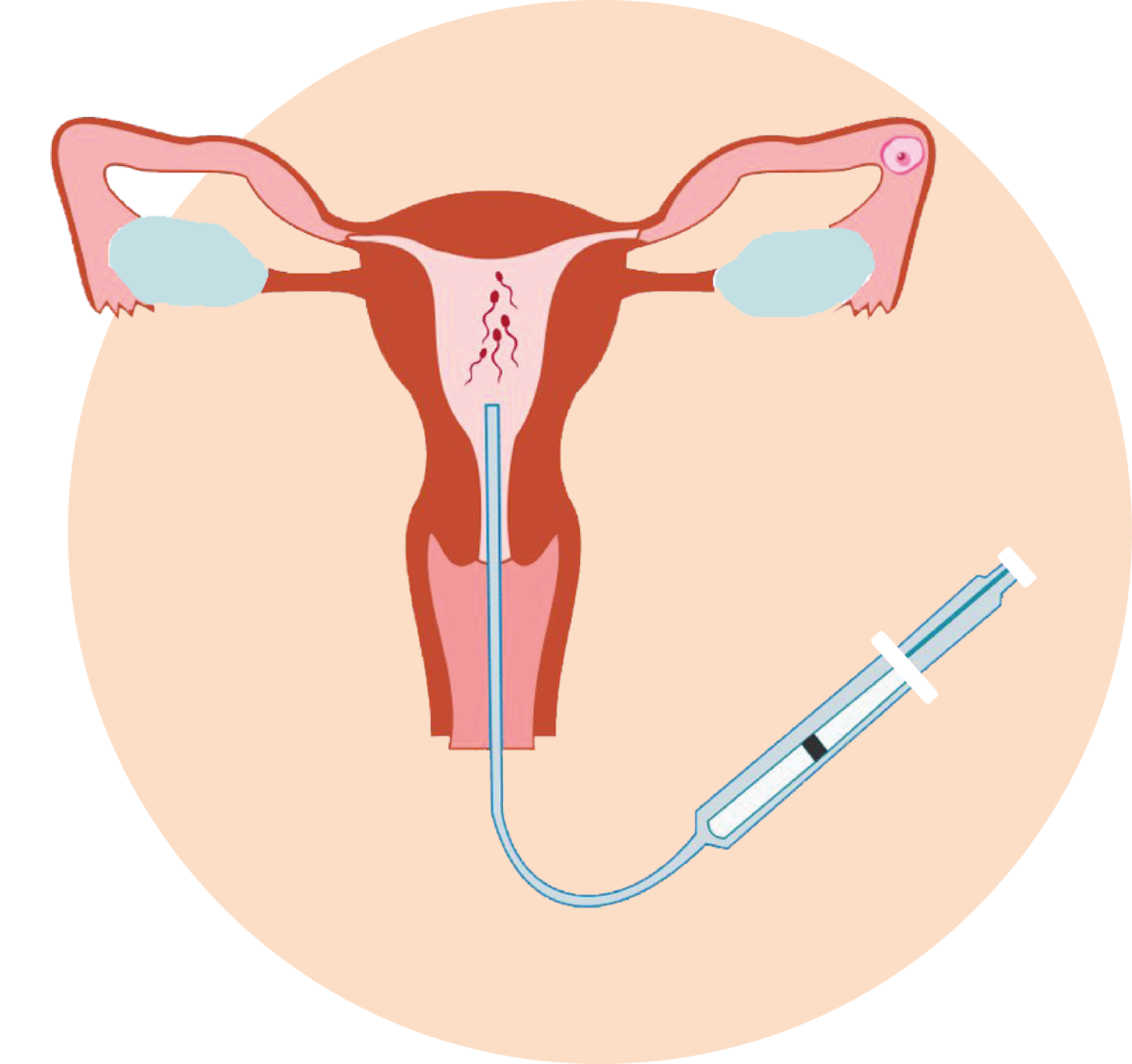
Low-tech options
The most common technique is artificial insemination (AI): a catheter is used to deposit a concentrate of previously purified sperm in the uterus and fertilization is expected to occur. It can be fresh or frozen semen.
Depending on the link between the recipient and the donor, the AI is homologous if there is a marital relationship, or heterologous when the sperm comes from a bank (guaranteed, but anonymous).
The technique is simple and its complications are very low. The probability of success is between 15 and 25 percent, but several attempts can be made. High-tech options
In Vitro Fertilization (IVF) requires an authorized laboratory for the sperm to fertilize the oocytes in a controlled environment. In less than a week, viable embryos can be transferred to a woman’s uterus to follow the natural course or frozen.
It is a complex, laborious method; only a quarter of the transfers are effective. The number of attempts depends on the number of embryos achieved.
There are classic IVF (the environment is created and the cells are activated) or by intracytoplasmic injection (the sperm is inoculated directly into the cell). In Cuba the first one is done.

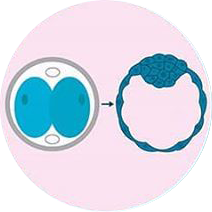
In vitro fertilization Observation of the embryonic development day by day
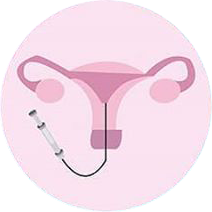
Embryo transfer to the uterus
The technique is simple and its complications are very low. The probability of success is between 15 and 25 percent, but several attempts can be made.
Solidarity childbirth
An increasingly common option for overcoming obstacles is surrogacy: a healthy woman is inseminated or lends her womb to receive embryos, and then hands over the baby to the person or couple who will raise it.
Examples of solidarity are the donation in sperm banks and giving embryos to other women when the desired number of children has been reached and they are available. Countries should regulate these processes because of the ethical and legal implications for their participants.
More than infertility
The AR is a useful service for very diverse users:
– Couples who are infertile due to a health condition detected in one or both of their members.
– Couples with no apparent obstacle that has tried for a reasonable time and does not achieve the desired pregnancy.
– Persons who wishe to exercise maternity or paternity without another parental figure in the upbringing.
– Couples of the same sex who depend on a donor or supportive womb.
– A person whose circumstances prevent the materialization of coitus or the assumption of parenthood and who wants to preserve his or her reproductive cells for more opportune stages. This has been the case for artists, sportsmen, people deprived of their liberty, with high-risk jobs or under medical treatment that compromises their fertility.
Deteriorated Highways Being Repaired

Deteriorated Highways Being Repaired
Villa Clara’s routes of national interest from the road to the tourist pole of Cayo Santa María are being repaired
 By Nelson García Santos
By Nelson García Santos
July 16, 2020
Translated and edited by Walter Lippmann for CubaNews.

Road to the tourist pole of Cayo Santa Maria Author: Twitter Published: 16/07/2020 | 10:55 am
SANTA CLARA, Villa Clara – In order to maintain the safety of traffic, conservation or repair actions are progressing in sections of the National Highway and the Central Highway in areas corresponding to this province, and the Caibarién to Cayo Santa María embankment, an important tourist pole in the northeast of the territory.
On the latter road, the laying of 2,000 tons of asphalt mix over three kilometers was completed, while the repair of three bridges, the metal road protection containers over seven kilometers and the renovation of signaling and repair of promenades, among other works, is in progress.
Pedro Julio González León, director of the Provincial Feasibility Center, emphasized that three kilometers of the motorway were also repaired, including the laying of rolling asphalt. Potholes were removed on the section between kilometre 260 and kilometre 320.
This and other works will continue in order to maintain the vitality of this road that, which, due to its years of operation, already needs capital repair in certain places
In addition, 1,900 tons of asphalt were laid along two kilometers of the Central Highway in Villa Clara Improvement work will continue there, as well as along the route from the Abel Santamaría International Airport to Caibarién and several of the Turquino Plan in Escambray.
What has been done, despite the limited resources and other effects, is part of the country’s effort to renew and stop the damage to the roads.
Subscribe to Blog via Email
| M | T | W | T | F | S | S |
|---|---|---|---|---|---|---|
| 1 | 2 | |||||
| 3 | 4 | 5 | 6 | 7 | 8 | 9 |
| 10 | 11 | 12 | 13 | 14 | 15 | 16 |
| 17 | 18 | 19 | 20 | 21 | 22 | 23 |
| 24 | 25 | 26 | 27 | 28 | 29 | 30 |
| 31 | ||||||




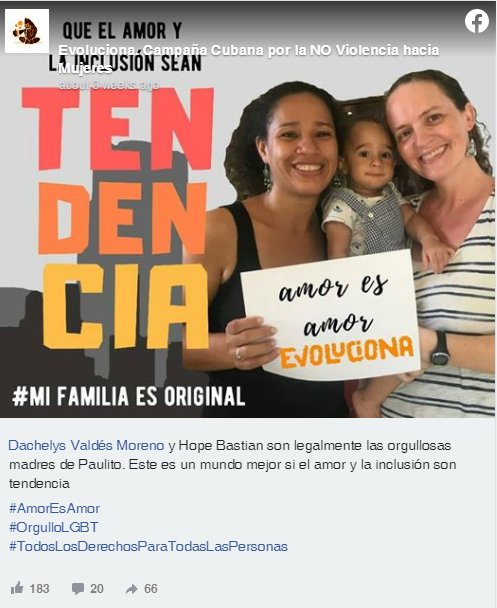
You must be logged in to post a comment.